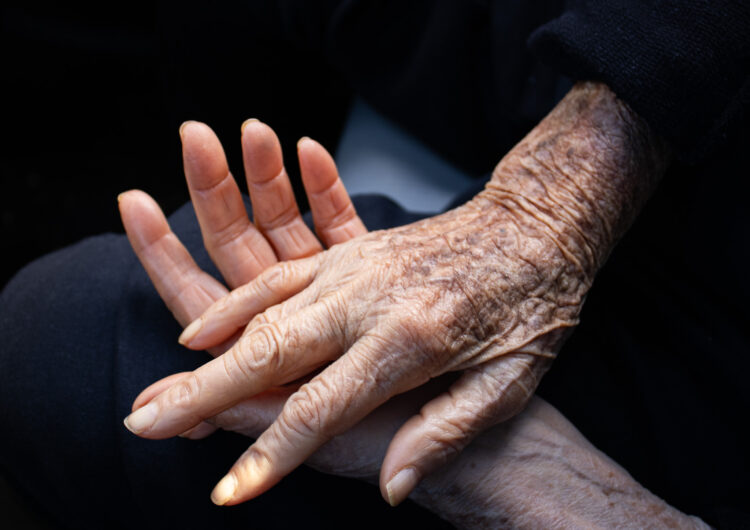My first memory is of Abuela stirring a pot in the kitchen. I stood beside her on my tippy toes, fingers curled on the cream-colored linoleum countertop.
“Cuando voy a la e’cuela voy a e’tudiar duro.” I promised.
“Así es.” Her large metal spoon scraped the bottom of the saucepan. Hot food sloshed around. Abuela’s father made her drop out before the third grade. Her dreams were reduced to household chores. She wanted more for me.
“Sigue mezclando, ¡que se va a pegar!” She handed the spoon over and paid close attention to me as I paid close attention to it.
If watching fire was a course, I had a front-row seat with a tenured professor. But I took it for granted. As soon as I stepped into a school, I stayed out of the kitchen. I never learned any of her recipes. I’m ashamed I didn’t even think to ask. I was busy with classes, working nonstop. I was a cashier, an intern, an assistant, and a designer. I grinded, scraped, sat, and ate. Abuela brought out the food as I stared into a screen. But she didn’t mind. She was proud. Maybe she knew words are food, too.
Abuela cooked nearly every meal I ate for twenty years. According to her, outside food no era comida. Even when she didn’t cook—like on summer Sunday barbecues when my father set black charcoal aflame and laid pink meat down on folded foil—she had seasoned it. Her sazón of purple onions, garlic, and peppers cut inside the palm of her hand, made our house smell for days.
She twisted chickens and placed them in boiling water. She de-feathered, cut, and washed them with care. She placed sazón and sugar on the skillet first, forcing the flavors to deepen and the meat to become a gooey brown. She served us first and sucked the feet last.
Sugar was her favorite ingredient. She would tear open a four-pound Domino bag and pour it directly into an olla, stirring until every grain dissolved. Her dulces were tooth-achingly sweet. She would pull her sharp machete out of the pantry and hack open coconuts on the kitchen floor. Then, she would scrape the husks raw and use the flesh for sticky dulce de coco. Every year, she hid a wobbly flan in the fridge for my birthday. And my favorite, her maíz caquiao, always had perfectly softened kernels.
She held metal trays straight from the oven as if heat couldn’t penetrate her skin. Her fingerprints were scattered across the cabinets, countertops, and doors. My mother would retrace Abuela’s steps with a damp rag. But as soon as the kitchen was clean, she was back inside.
Don’t get it twisted. Abuela’s life wasn’t cooking; it was caring for people. She memorized guests’ favorite dishes and had them ready when they returned. She asked my friends what they wanted and waited patiently as I translated their requests. She spent weeks at a time in the Dominican Republic, listening to everyone who stopped by her marquesina, offering a cafecito for their thoughts. She returned home with a raspy, inaudible voice gone with the advice she had given.
She felt like everyone’s abuela.
She threw her husband out after seven short years and devoted herself to her community. She raised kids that weren’t hers. She had more godchildren than she could count. She made her kids sit in the corner of parties while she took over the dance floor. She prayed each night at the altar by her bed.
But she was my Abuela, not theirs.
She moved to America when I was three months old and slept beside me for years. She took me on shopping trips around the neighborhood. She spontaneously challenged me to race down the block and always let me win. She whispered “no llores mi niña” whenever she saw me cry.
The first time Abuela left the stove on, we thought it was an accident. She was probably on the phone, offering consejos como medicina. Or las noticias had distracted her. Maybe her ironing pile was too tall, the steam too hot. But her mind melted faster than we could grasp. Thoughts dripped from one conversation to the next. Simple names slipped her mind. Less than a year later, she was forced to resign her throne. Her life was reduced to aimless shuffling.
When she left the kitchen, it was as if the doors to her soul flew open. She stirred around with nothing to do, her hands grasped the air searching for something to cut, mix, wring, or hold. Misplaced belongings and subtle confusion turned into frustrated accusations. She claimed we were stealing from her, swearing she was in the wrong place but unable to find where the right one was. She tried to run away as if held hostage in this body, place, and time. She asked us over and over again, ‘¿Quién tú eres?’ until she didn’t think to ask at all.
Words faded in and out of her consciousness. ¿Qué es piso? ¿Qué es cuchara? Her depth perception was mixed up, too. She reached for things across the room, spoke to photographs like old friends, stopped recognizing her reflection, and forgot how to write her name. She stopped dancing and praying.
My second memory is also of Abuela. She was on her way out of the house, heading to my uncle’s for the weekend. But she always slept by my side. I screamed, I cried, I burned red. I wrapped my tiny body around her and begged her to stay. She tried to calm me down, unsuccessfully. I can’t remember what she said. The only thing that remains clear is a knot in the pit of my stomach like bad food bubbling up—a warning that as soon as she leaves, my world will crumble.
Recently, I brought Abuela home after she spent the day at my house. She lives with my aunt now, her full-time caretaker. When we arrived, I pulled her out of the car, guided her up the stairs, and delivered her inside.
I went to hug her goodbye, but she grabbed my hand, looked me in the eyes, and smiled. For a moment, I imagined that she recognized me, even though it’s been seven years since she last called me by my name.
“Me voy Abuela.”
“No. No te vayas,” she pleaded. I wished she would throw a tantrum, beg me to stay, tell me she loved me, remembered, and wanted to play card games on the couch, race down the street, and dance to her favorite merengue while stirring dulce in a saucepan, around and around until it thickened. But she didn’t. She went silent. The glimmer in her eyes faded and an empty gaze spread across her face.
I don’t know any of Abuela’s recipes. She took them with her when her mind dissolved. I can’t even make a simple sazón. But I’m here writing, hoping that wherever her mind may be, she knows que sigo mezclando.

Anny Caba is a Dominican American writer and solo female traveler. She has journeyed to over 30 countries, sharing tips, guides, and her adventures on her blog Anny Abroad. Her goal is to empower others—especially women—to step outside their comfort zones and discover new places. She is currently working on her debut novel, Mamey, dedicated to her Spanglish heritage.





